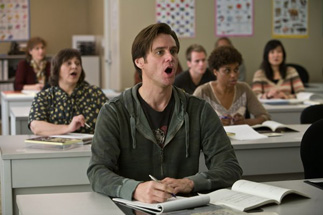|
|
Book vs. Movie: Yes ManBy Russ BickerstaffDecember 29, 2008
The Movie Unfortunately, Jack Black did NOT, in fact, end up being at all involved in the Yes Man film. What's worse, Wallace ended up having very little to do with it either. When Wallace was informed that Jim Carrey would be starring in an Americanized, Hollywood adaptation of his book, he was excited. Evidently he'd been a fan of the spastic, rubbery actor since In Living Color. A book that was so driven by the voice of a single, idiosyncratic author has been adapted into what appears to be a standard assembly-line movie churned out on a Hollywood assembly line. Richard D. Zanuck and a number of other producers put together a project with three relatively new screenwriters, one of whom had no previous credits worth speaking of and the other two whose work weighed pretty heavily in TV. They cranked out a script that was directed by Peyton Reed. Jim Carrey stars as Carl Allen - a loan officer at a bank in California who has been in a rut since a divorce. Unwilling to try anything new or even make it out of his apartment after work, Allen's life seems to be on pause until an encounter with an ex-co-worker finds him visiting a seminar by self-help guru Terrence Bundley (Terence Stamp.) Bundley preaches a fanatical devotion to the word, "yes," to a convention hall full of devotees.
[ View other columns by Russ Bickerstaff ]
[ View other Book vs. Movie columns ]
[ Email this column ]
|

|
|
|

|
Saturday, April 27, 2024
© 2024 Box Office Prophets, a division of One Of Us, Inc.


